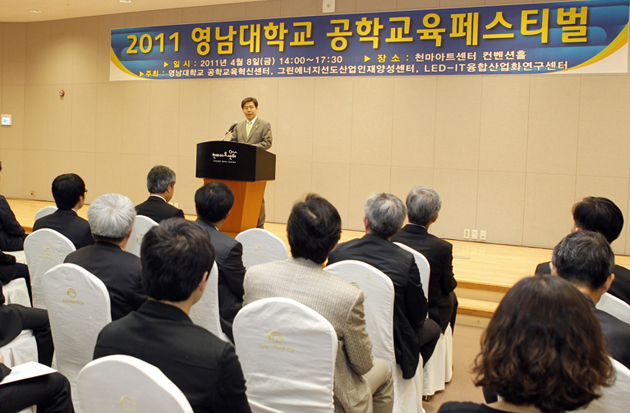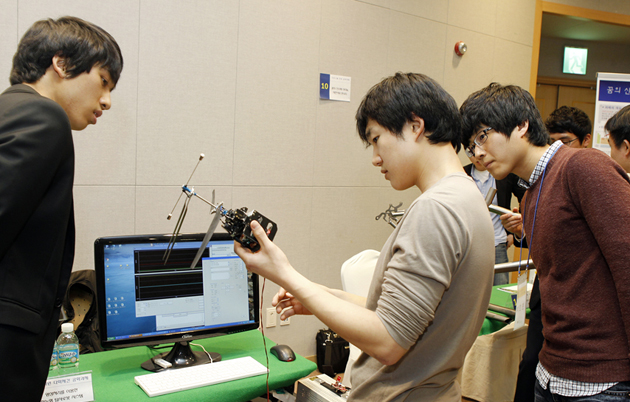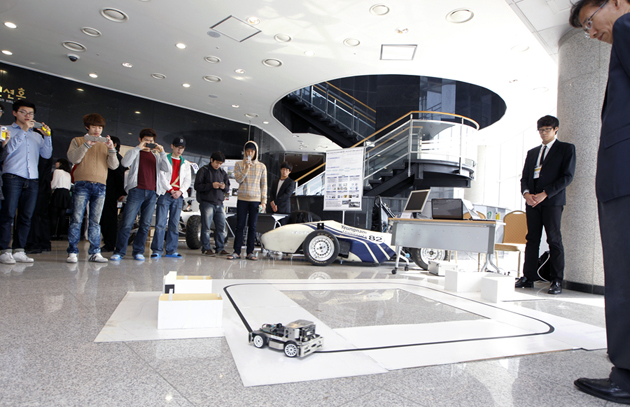Selected Again for the Second Stage of Center for Innovation of Engineering Education Support Project N
No.88476- Writer YU
- Date : 2012.04.18 19:16
- Views : 10150
Procure national funding of 200 million won every year for up to 10 years
Focus on fostering creative and convergence-type engineering personnel
[Apr 3, 2012]

Yeungnam University (President Lee, Hyo-soo) was finally selected for the 'Center for Innovation of Engineering Education Support Project'. After receiving national funding for five years since being selected for the first stage in 2007, it was again selected for the second stage for the next ten years to 2022.
According to the Ministry of Education, Science and Technology and the Korea Institute for Advancement of Technology, a total of 65 universities, including Yeungnam University, were selected for the 'Center for Innovation of Engineering Education Support Project' that aims at fostering creative and convergence-type engineering talents.
By region, ▲ 10 universities including Yeungnam University, Kangwon National University, Kumoh National Institute of Technology, Daegu University, and Handong University were selected from the Daegu, Gyeongbuk and Gangwon regions, ▲ 24 including Seoul National University, Korea University, Yonsei University, Ewha Womans University, Chungang University, Sungkyunkwan University, and Ajou University were selected in the greater Seoul area ▲ 9 including Korea National University of Transportation (Chungju), Dankook University (Cheonan), Soonchunhyang University, and the Korea University of Technology and Education were selected from the Chungcheong region ▲ 11 including Chonnam National Univeristy, Chonbuk National University and Chosun University were selected from the Honam region, and ▲ 11 universities including Pusan National University, Donga University, Univerity of Ulsan and Changwon National University were selected from the southeastern region.
This shows that of the 86 universities that applied after first regional assessment and second national integrated evaluations last month, 21 universities were disqualified. In addition, of the 60 universities that participated in the first stage project from 2007-2011, 12 universities that showed poor performance were left off, while 17 universities that presented systematic educational program operation plans were newly selected.
YU were selected for the first stage (Jun 2007 - Feb 2012) and also for the second stage (Mar 2012 - Feb 2022), and will thus receive national funding of about 200 million won per year for up to the next ten years. Accordingly, YU is planning to set the Center for Innovation of Engineering Education (director Song, Dong-joo) as the control tower in the College of Engineering and to focus on fostering creative and convergence-type engineering talents. In particular, it is planning to strengthen the 'ABEEK' certification system in order to foster engineers who fit global standards. As of March 2012, there are a total 5,741 engineering students who are in the ABEEK certification program at YU, which is 70.3% of all engineering students. YU is planning to enhance this in terms of both quantity and quality. Furthermore, plans are also being made to support the accumulate of various creative design experience by jointly conducting inter-disciplinary programs, as well as capstone design (general design) programs with overseas universities. It is also planning to cooperate with domestic and foreign companies and government bodies, while connecting it to LINC projects, HRD projects and the human resource training projects for regional innovation to concentrate on fostering creative engineering talents with strong character and leadership.


The 'Center for Innovation of Engineering Education Support Project' was pursued since 2007 in order to resolve the imbalances caused by the differences in the skill level of university graduate engineers and the level needed in industries. In the first stage, hardware innovation such as construction of an engineering education improvement system in colleges and development of educational programs were conducted. In the second stage, the software innovation such as industrial work programs including capstone design and field work will be strengthened, and programs that are integrated with humanities and arts will be focused upon. The Ministry of Education, Science and Technology will subdivide the total project period into three periods (3+3+4 years) and is planning to disqualify the lowest performers through mid-term evaluations.